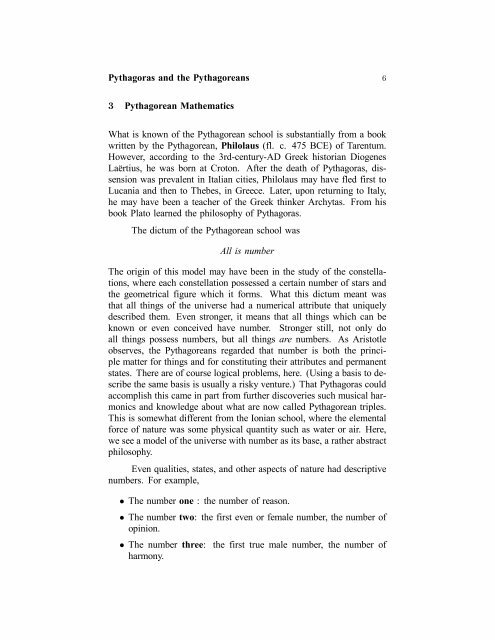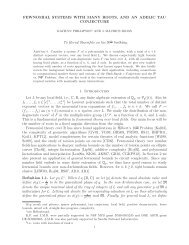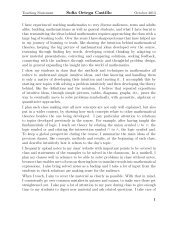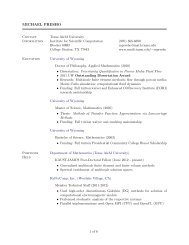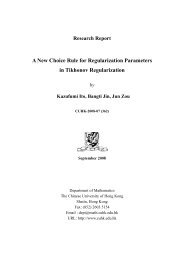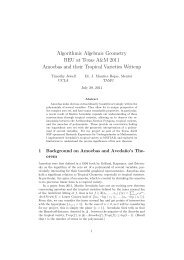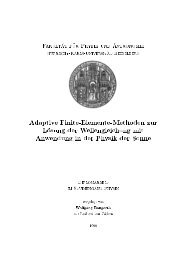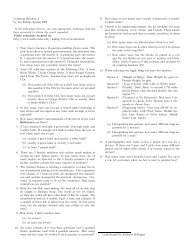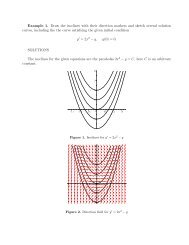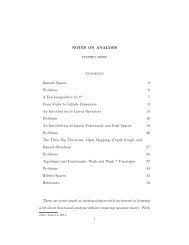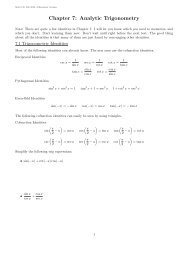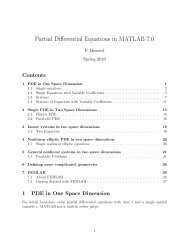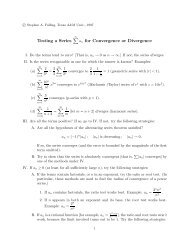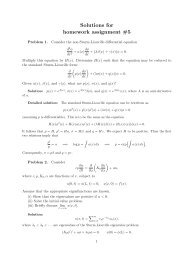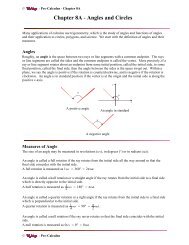Pythagoras and the Pythagoreans - Department of Mathematics
Pythagoras and the Pythagoreans - Department of Mathematics
Pythagoras and the Pythagoreans - Department of Mathematics
Create successful ePaper yourself
Turn your PDF publications into a flip-book with our unique Google optimized e-Paper software.
<strong>Pythagoras</strong> <strong>and</strong> <strong>the</strong> <strong>Pythagoreans</strong> 6<br />
3 Pythagorean Ma<strong>the</strong>matics<br />
What is known <strong>of</strong> <strong>the</strong> Pythagorean school is substantially from a book<br />
written by <strong>the</strong> Pythagorean, Philolaus (fl. c. 475BCE)<strong>of</strong>Tarentum.<br />
However, according to <strong>the</strong> 3rd-century-AD Greek historian Diogenes<br />
Laërtius, he was born at Croton. After <strong>the</strong> death <strong>of</strong> <strong>Pythagoras</strong>, dissension<br />
was prevalent in Italian cities, Philolaus may have fled first to<br />
Lucania <strong>and</strong> <strong>the</strong>n to Thebes, in Greece. Later, upon returning to Italy,<br />
he may have been a teacher <strong>of</strong> <strong>the</strong> Greek thinker Archytas. From his<br />
book Plato learned <strong>the</strong> philosophy <strong>of</strong> <strong>Pythagoras</strong>.<br />
The dictum <strong>of</strong> <strong>the</strong> Pythagorean school was<br />
All is number<br />
The origin <strong>of</strong> this model may have been in <strong>the</strong> study <strong>of</strong> <strong>the</strong> constellations,<br />
where each constellation possessed a certain number <strong>of</strong> stars <strong>and</strong><br />
<strong>the</strong> geometrical figure which it forms. What this dictum meant was<br />
that all things <strong>of</strong> <strong>the</strong> universe had a numerical attribute that uniquely<br />
described <strong>the</strong>m. Even stronger, it means that all things which can be<br />
known or even conceived have number. Stronger still, not only do<br />
all things possess numbers, but all things are numbers. As Aristotle<br />
observes, <strong>the</strong> <strong>Pythagoreans</strong> regarded that number is both <strong>the</strong> principle<br />
matter for things <strong>and</strong> for constituting <strong>the</strong>ir attributes <strong>and</strong> permanent<br />
states. There are <strong>of</strong> course logical problems, here. (Using a basis to describe<br />
<strong>the</strong> same basis is usually a risky venture.) That <strong>Pythagoras</strong> could<br />
accomplish this came in part from fur<strong>the</strong>r discoveries such musical harmonics<br />
<strong>and</strong> knowledge about what are now called Pythagorean triples.<br />
This is somewhat different from <strong>the</strong> Ionian school, where <strong>the</strong> elemental<br />
force <strong>of</strong> nature was some physical quantity such as water or air. Here,<br />
we see a model <strong>of</strong> <strong>the</strong> universe with number as its base, a ra<strong>the</strong>r abstract<br />
philosophy.<br />
Even qualities, states, <strong>and</strong> o<strong>the</strong>r aspects <strong>of</strong> nature had descriptive<br />
numbers. For example,<br />
• The number one : <strong>the</strong> number <strong>of</strong> reason.<br />
• The number two: <strong>the</strong> first even or female number, <strong>the</strong> number <strong>of</strong><br />
opinion.<br />
• The number three: <strong>the</strong> first true male number, <strong>the</strong> number <strong>of</strong><br />
harmony.


